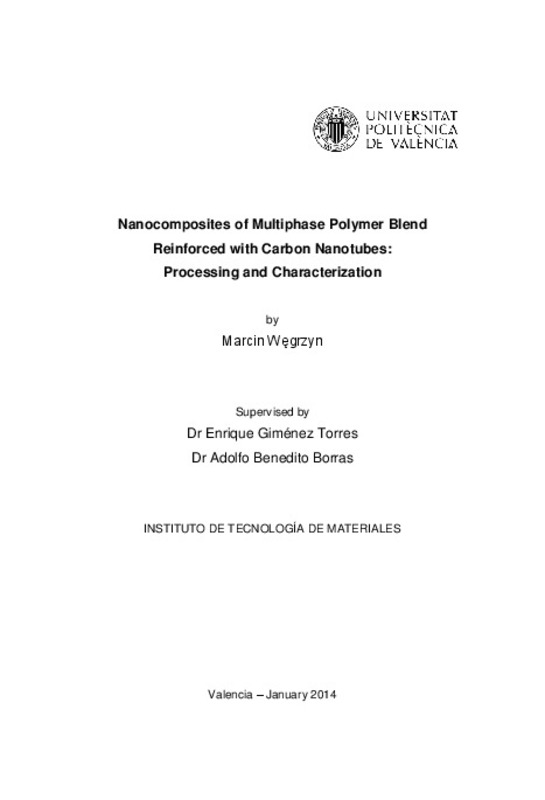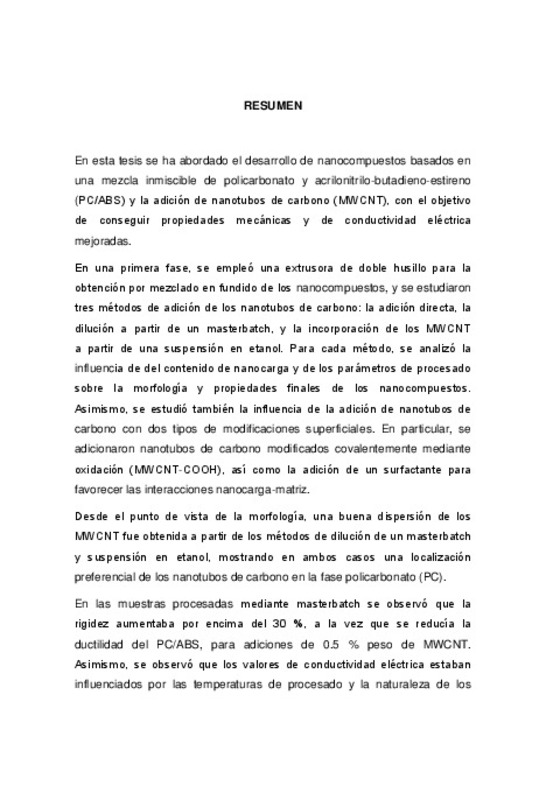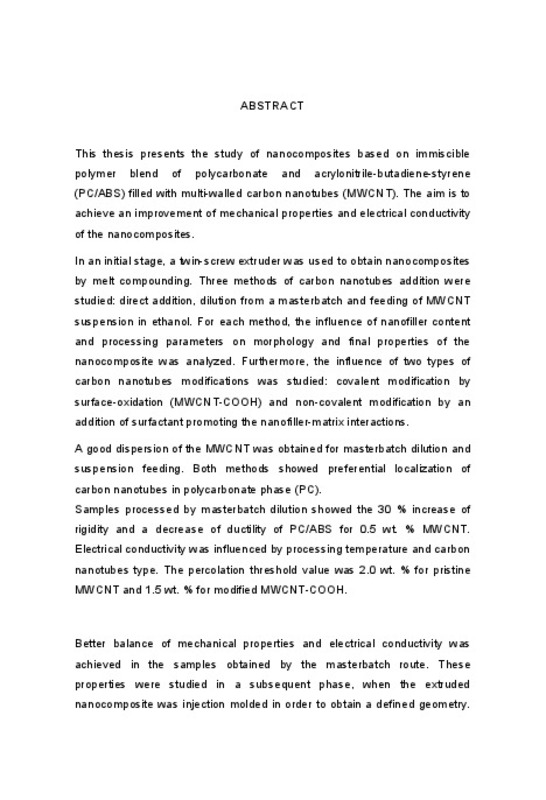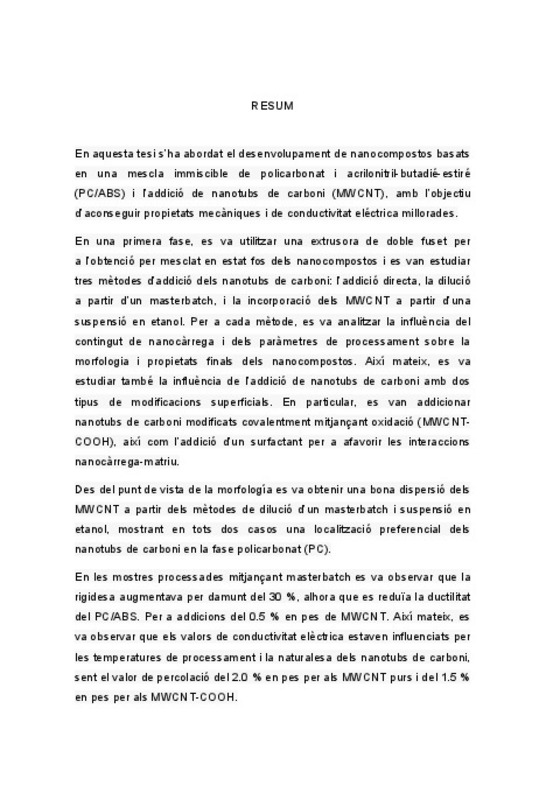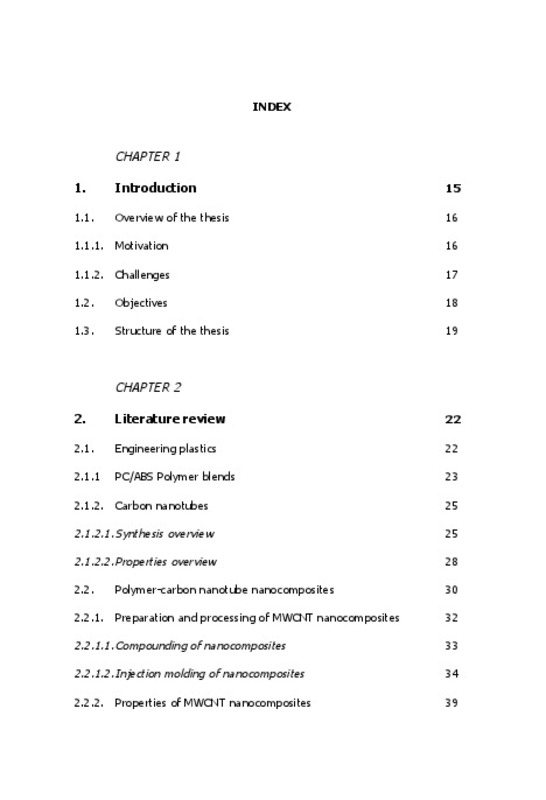- RiuNet repositorio UPV
- :
- Investigación
- :
- Tesis doctorales
- :
- Ver ítem
JavaScript is disabled for your browser. Some features of this site may not work without it.
Buscar en RiuNet
Listar
Mi cuenta
Estadísticas
Ayuda RiuNet
Admin. UPV
Nanocomposites of Multiphase Polymer Blend Reinforced with Carbon Nanotubes: Processing and Characterization
Mostrar el registro sencillo del ítem
Ficheros en el ítem
| dc.contributor.advisor | Benedito Borrás, Adolfo
|
es_ES |
| dc.contributor.advisor | Giménez Torres, Enrique
|
es_ES |
| dc.contributor.author | WEGRZYN, MARCIN
|
es_ES |
| dc.date.accessioned | 2014-04-07T06:35:44Z | |
| dc.date.available | 2014-04-07T06:35:44Z | |
| dc.date.created | 2014-03-21T11:00:18Z | es_ES |
| dc.date.issued | 2014-04-07T06:35:41Z | es_ES |
| dc.identifier.uri | http://hdl.handle.net/10251/36869 | |
| dc.description.abstract | This thesis presents the study of nanocomposites based on immiscible polymer blend of polycarbonate and acrylonitrile-butadiene-styrene (PC/ABS) filled with multi-walled carbon nanotubes (MWCNT). The aim is to achieve an improvement of mechanical properties and electrical conductivity of the nanocomposites. In an initial stage, a twin-screw extruder was used to obtain nanocomposites by melt compounding. Three methods of carbon nanotubes addition were studied: direct addition, dilution from a masterbatch and feeding of MWCNT suspension in ethanol. For each method, the influence of nanofiller content and processing parameters on morphology and final properties of the nanocomposite was analyzed. Furthermore, the influence of two types of carbon nanotubes modifications was studied: covalent modification by surface-oxidation (MWCNT-COOH) and non-covalent modification by an addition of surfactant promoting the nanofiller-matrix interactions. A good dispersion of the MWCNT was obtained for masterbatch dilution and suspension feeding. Both methods showed preferential localization of carbon nanotubes in polycarbonate phase (PC). Samples processed by masterbatch dilution showed the 30 % increase of rigidity and a decrease of ductility of PC/ABS for 0.5 wt. % MWCNT. Electrical conductivity was influenced by processing temperature and carbon nanotubes type. The percolation threshold value was 2.0 wt. % for pristine MWCNT and 1.5 wt. % for modified MWCNT-COOH. Better balance of mechanical properties and electrical conductivity was achieved in the samples obtained by the masterbatch route. These properties were studied in a subsequent phase, when the extruded nanocomposite was injection molded in order to obtain a defined geometry. | en_EN |
| dc.language | Inglés | es_ES |
| dc.publisher | Universitat Politècnica de València | es_ES |
| dc.rights | Reserva de todos los derechos | es_ES |
| dc.source | Riunet | es_ES |
| dc.subject | Nanocomposite | es_ES |
| dc.subject | Carbon nanotube | es_ES |
| dc.subject | Multi-phase polymer blend | es_ES |
| dc.subject | Compounding | es_ES |
| dc.subject | Injection molding. | es_ES |
| dc.subject.classification | CIENCIA DE LOS MATERIALES E INGENIERIA METALURGICA | es_ES |
| dc.title | Nanocomposites of Multiphase Polymer Blend Reinforced with Carbon Nanotubes: Processing and Characterization | |
| dc.type | Tesis doctoral | es_ES |
| dc.identifier.doi | 10.4995/Thesis/10251/36869 | es_ES |
| dc.rights.accessRights | Abierto | es_ES |
| dc.contributor.affiliation | Universitat Politècnica de València. Departamento de Ingeniería Mecánica y de Materiales - Departament d'Enginyeria Mecànica i de Materials | es_ES |
| dc.description.bibliographicCitation | Wegrzyn, M. (2014). Nanocomposites of Multiphase Polymer Blend Reinforced with Carbon Nanotubes: Processing and Characterization [Tesis doctoral no publicada]. Universitat Politècnica de València. https://doi.org/10.4995/Thesis/10251/36869 | es_ES |
| dc.description.accrualMethod | TESIS | es_ES |
| dc.type.version | info:eu-repo/semantics/acceptedVersion | es_ES |
| dc.relation.tesis | 7276 | es_ES |
Este ítem aparece en la(s) siguiente(s) colección(ones)
-
Tesis doctorales [5346]






